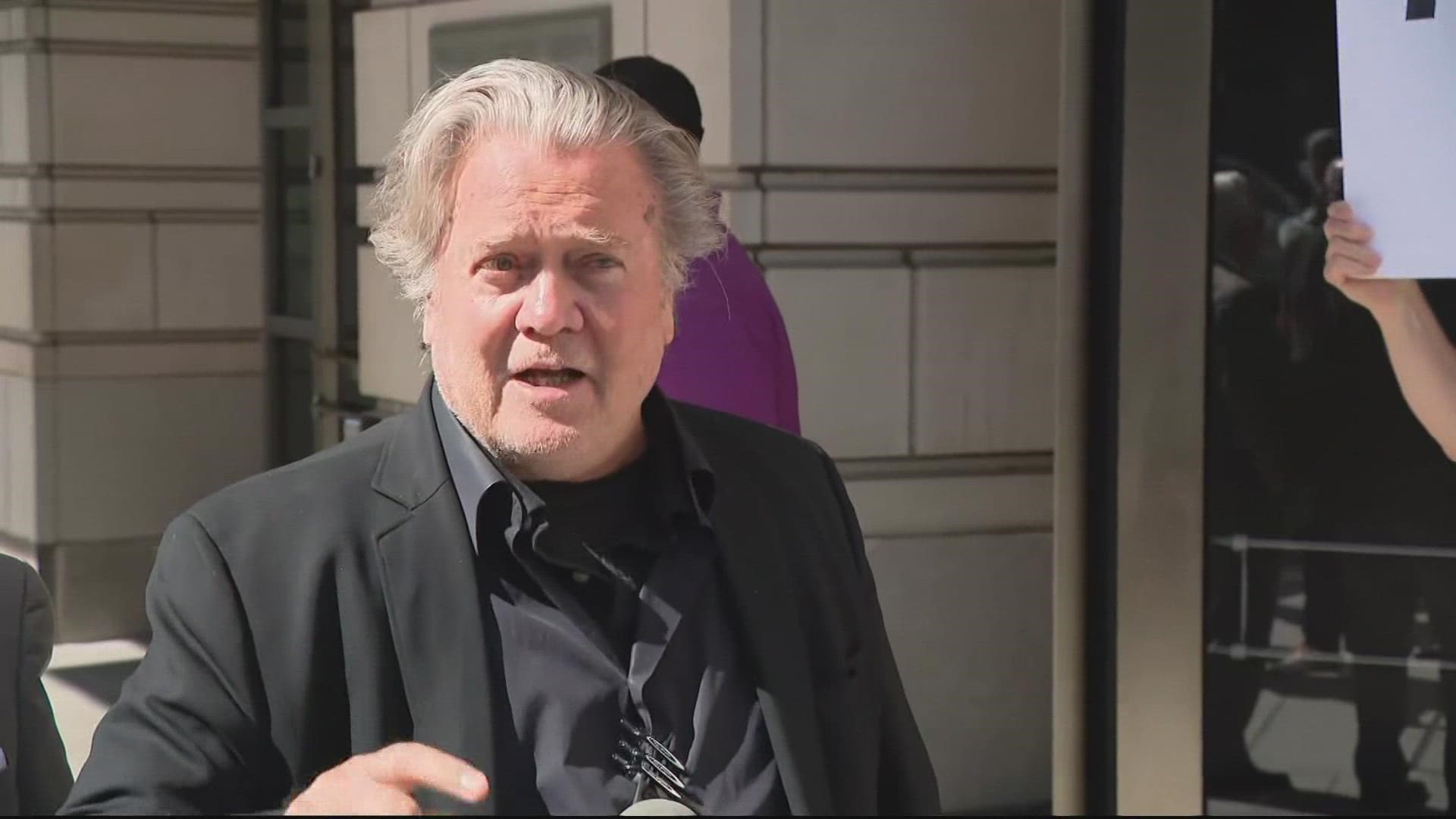WASHINGTON — A federal judge ruled Monday that Steve Bannon cannot tell members of a jury he defied a congressional subpoena under orders from former President Donald Trump.
U.S. District Judge Carl Nichols, a Trump appointee, granted the Justice Department's request to block Bannon from relying on entrapment and public authority defenses that would have seen him argue he failed to appear for a deposition before the January 6th Committee because he was following instructions from the former president. Bannon served for a time as Trump's 2016 campaign manager and as a senior adviser in the White House, but had been gone from the administration for more than three years before Jan. 6, 2021.
Relying on the 1961 D.C. Circuit Court decision in Licavoli v. United States — a contempt of Congress case involving former Detroit mobster Peter Licavoli — Nichols said Bannon also couldn't tell a jury he'd defied the subpoena under advice of counsel or because he relied on Office of Legal Counsel opinions about prosecuting Executive Branch employees for contempt. But the loss of the executive privilege argument will likely hit Bannon's case hardest since, as his attorney David Schoen said Monday, it has been the cornerstone of his defense since his indictment in November.
“Mr. Bannon has taken a principled stance from day one," Schoen said. "His principled position has been, ‘My hands were tied.’”
However, Nichols said, a letter last year from Trump's attorneys did not instruct Bannon not to testify or turn over documents about subjects not related to the former president. And, Nichols said, Trump was not a public official at the time the letter was sent on his behalf.
“The former president, in his civilian capacity, is by definition not a public official," Nichols said. "Especially, considering under the circumstances, he never instructed Mr. Bannon not to show up altogether.”
The series of rulings, delivered one after another in federal court Monday, shut off all but a narrow avenue of defense for Bannon — who promised following his indictment to make his case "the misdemeanor from hell" for Attorney General Merrick Garland, Speaker of the House Nancy Pelosi (D-CA) and others.
Last month, Bannon subpoenaed Pelosi, January 6th Committee Bennie Thompson (D-MS) and other members of House Democratic leadership. On Monday, Nichols quashed those subpoenas. Among other reasons, Nichols said the U.S. Constitution's Speech and Debate Clause granted them immunity from the subpoenas.
Nichols left open a narrow window for Bannon to enter any evidence he may have about his belief that the return date on his subpoena was not operative, but it was not clear that was something the defense was prepared to argue. Schoen asked Nichols to address any objections on that basis the Justice Department might have before the next pretrial conference in the case on Thursday.
"We have to make a decision... what's the point in going to trial here if there's no defenses?" Schoen asked.
Over the weekend, Bannon sent a letter to the January 6th Committee saying Trump had "decided it would be in the best interests of the American people" to waive executive privilege over Bannon — paving the way for him to testify and provide documents. However, in a filing overnight, prosecutors said an attorney for Trump, Justin Clark, had told the FBI in a June 29 interview that Trump "never invoked executive privilege over any particular information or materials" with respect to Bannon and that Trump's letter to him "provided no basis for total noncompliance."
In their filing, prosecutors said it appeared to them Bannon was merely seeking a way to avoid the consequences of a trial.
"... The Defendant’s sudden wish to testify is not a genuine effort to meet his obligations but a last-ditch attempt to avoid accountability," assistant U.S. attorney Amanda Vaughn wrote in the filing.
Jury selection was scheduled to begin in Bannon's trial on Monday. If convicted, he faces a minimum sentence of 30 days in prison and a maximum sentence of one year on both counts of contempt of Congress.
This is a developing story and will be updated.
We're tracking all of the arrests, charges and investigations into the January 6 assault on the Capitol. Sign up for our Capitol Breach Newsletter here so that you never miss an update.

